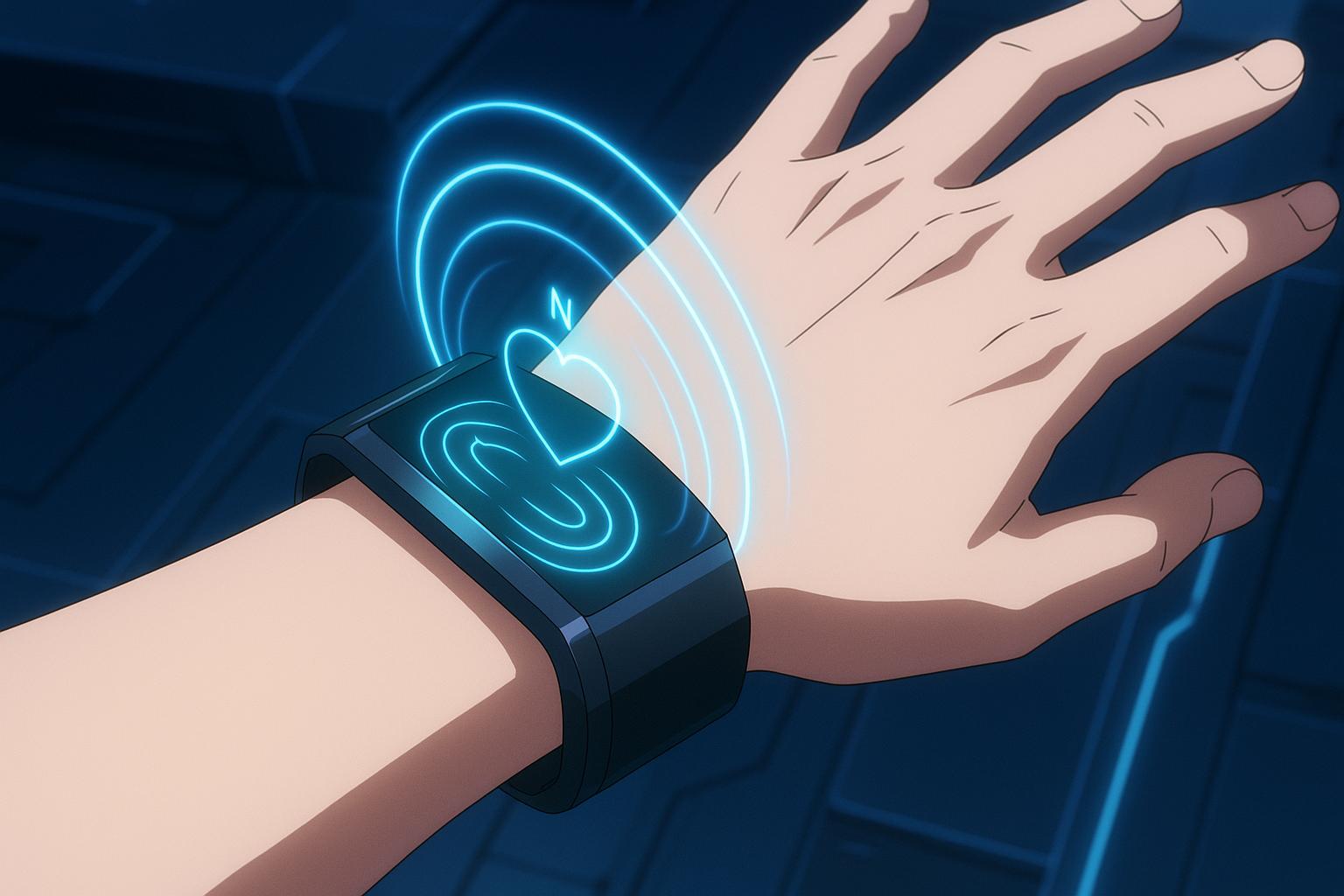Glasgow-based tech firm Neuranics secures £6.2 million funding to expand its team and commercialise ultra-sensitive magnetic sensor technology, enabling contactless muscle and heart monitoring with applications spanning health, XR, and human-machine interfaces.
Neuranics, a burgeoning tech company based in Glasgow, is poised for significant expansion, with plans to double its workforce following a successful investment round. The company has developed cutting-edge, ultra-sensitive sensors capable of detecting minute magnetic signals from the human body. This innovative technology enables precise tracking of muscle activity for gesture recognition and heart signals without the need for skin contact, promising applications that range from health and fitness to immersive experiences in the metaverse.
The company asserts that its magnetic sensing technology not only enhances accuracy but also significantly reduces power consumption, facilitating continuous monitoring from virtually anywhere. Their claim highlights an ambition to innovate in advanced fields, including extended reality (XR), wearable devices, human-machine interfaces, and digital health. These advancements could potentially redefine interactions across various sectors, from automotive and industrial monitoring to aerospace, defence, and renewable energy.
Noel McKenna, CEO of Neuranics, expressed his enthusiasm for the company’s growth trajectory, stating, “Following our successful investment round, we are delighted to announce significant expansion of our team in Glasgow to support our drive for global commercialisation.” He further emphasised Scotland’s pivotal role in the semiconductor industry, noting the importance of attracting skilled talent to maintain the region’s competitive edge.
The recent £6.2 million investment round, led by Blackfinch Ventures and assisted by organisations such as Archangels and the universities of Glasgow and Edinburgh, aims to propel Neuranics into high-volume markets. This financial backing follows a previous £1.9 million funding injection secured in September, which also involved contributions from GU Holdings Ltd and Old College Capital. Such investments coupled with strategic collaborations—especially with key players in Silicon Valley—position Neuranics favourably for expanded commercial reach.
In addition to boosting its headcount, Neuranics is set to further integrate its Tunnelling Magnetoresistance (TMR) technology into emerging markets. This is particularly relevant as a grant of £800,000 from Scottish Enterprise has been earmarked for a £2.4 million project focused on redefining human-machine interaction through innovative wristband technology, slated for launch next January at the Consumer Electronics Show in Las Vegas.
Neuranics’ focus on transformative health monitoring devices and human-machine interfaces is underscored by their innovative magnetomyography wristband, which detects muscle activity for gesture recognition. This wristband not only serves health and fitness applications but is also designed with XR in mind, providing a seamless interface for immersive digital experiences. The project is expected to create ten high-tech jobs at their Glasgow headquarters, reinforcing Scotland’s stature in the wearable technology arena.
As Neuranics continues to evolve, it stands as a beacon of the potential harboured by Scotland’s tech ecosystem. Its trajectory showcases a commitment to leveraging groundbreaking semiconductor technology to shape myriad industries and enhance everyday human experiences. The future certainly appears bright for this ambitious firm, as it marches forward with plans that could redefine how we interact with the world around us.
Reference Map
- Paragraphs 1, 2, 3, 4, 5, 6, 7: Sources 1, 2, 3, 4, 5, 6.
Source: Noah Wire Services
- https://www.heraldscotland.com/news/25175192.scottish-tech-company-reveals-plans-double-job-numbers/?ref=rss – Please view link – unable to able to access data
- https://www.heraldscotland.com/news/25175192.scottish-tech-company-reveals-plans-double-job-numbers/?ref=rss – Neuranics, a Glasgow-based company, has developed ultra-sensitive, low-power, and scalable sensors capable of detecting tiny magnetic signals from the human body. These sensors enable precise tracking of muscle activity for gesture recognition and heart signals without skin contact. The technology has applications in health, fitness, and the metaverse, offering improved accuracy, reduced power consumption, and potential for continuous monitoring worldwide. Neuranics aims to drive innovation in advanced applications, including extended reality (XR), wearable devices, human-machine interfaces, and digital health, with potential to impact industries such as automotive, industrial monitoring, aerospace, defense, and renewable energy.
- https://www.gla.ac.uk/news/archiveofnews/2023/september/headline_1006827_en.html – In September 2023, Neuranics secured a £1.9 million investment led by Par Equity, with participation from the University of Glasgow’s investment company, GU Holdings Ltd, Old College Capital, the University of Edinburgh’s venture investment fund, and London-based Creator Fund. Founded in 2021 as a joint spinout from the University of Glasgow and the University of Edinburgh, Neuranics develops pioneering magnetic sensors integrated with semiconductor technology for health, fitness, and metaverse applications. Their patented technology uses scalable spintronics sensors powered by semiconductors to detect tiny magnetic signals from organs of the body, such as the heart and muscles of the arms, aiming to transform current health monitoring devices and human-machine interfaces.
- https://www.businesswire.com/news/home/20241009826879/en/Neuranics-Announces-%C2%A32.4-Million-Project-to-Revolutionise-Human-Machine-Interfaces-with-Scottish-Enterprise-Support – In October 2024, Neuranics secured an £800,000 grant from Scottish Enterprise to support a £2.4 million project aimed at transforming human-machine interactions through innovative wristband technology. The wristbands, leveraging Neuranics’ patented magnetic sensors, will detect muscle activity and precise gestures, initially targeting extended reality (XR) applications to enable seamless gesture recognition for immersive digital experiences. The project is expected to create ten high-tech jobs at Neuranics’ Glasgow headquarters and bolster Scotland’s position as a leader in wearable technology.
- https://scottishfinancialreview.com/2025/04/09/neuranics-scots-deep-tech-spinout-raises-8m/ – In April 2025, Neuranics, a deep-tech semiconductor company and joint spinout between the universities of Edinburgh and Glasgow, raised $8 million to accelerate global growth and commercial adoption of its magnetic sensing technology. The investment round was led by Blackfinch Ventures, with participation from Archangels, and continued support from Par Equity, the University of Glasgow, and Old College Capital, the University of Edinburgh’s venture investment fund. The funding aims to strengthen Neuranics’ team, accelerate innovation across core technologies, and enable widespread integration of its Tunnelling Magnetoresistance (TMR) technology into emerging and high-tech markets, including extended reality (XR), wearables, and digital health monitoring.
- https://neuranics.com/neuranics-secures-1-9m-in-seed-investment/ – In September 2023, Neuranics secured a £1.9 million investment led by Par Equity, with participation from the University of Glasgow, Old College Capital, the University of Edinburgh’s venture investment fund, and London-based Creator Fund. Founded in 2021 as a joint spinout from the University of Glasgow and the University of Edinburgh, Neuranics develops pioneering magnetic sensors integrated with semiconductor technology for health, fitness, and metaverse applications. Their patented technology uses scalable spintronics sensors powered by semiconductors to detect tiny magnetic signals from organs of the body, such as the heart and muscles of the arms, aiming to transform current health monitoring devices and human-machine interfaces.
- https://neuranics.com/neuranics-honoured-by-ces-innovation-award/ – In November 2024, Neuranics’ Magnetomyography (MMG) Magnetic Sensor was named a CES 2025 Innovation Awards Honoree in the XR Technologies & Accessories category. This prestigious award, presented by the Consumer Technology Association, celebrates groundbreaking product design and engineering shaping the future of technology. Neuranics’ MMG Magnetic Sensors leverage advanced Tunneling Magnetoresistance (TMR) technology to detect minute magnetic signals generated by muscle activity, enabling seamless gesture recognition and real-time health monitoring. These capabilities make them ideal for wearable health devices and extended reality (XR) applications.
Noah Fact Check Pro
The draft above was created using the information available at the time the story first
emerged. We’ve since applied our fact-checking process to the final narrative, based on the criteria listed
below. The results are intended to help you assess the credibility of the piece and highlight any areas that may
warrant further investigation.
Freshness check
Score:
9
Notes:
The narrative references recent events such as a £6.2 million investment round and plans for a product launch at the upcoming Consumer Electronics Show in January, indicating freshness. No indication of outdated roles or recycled content is detected. The details about recent funding rounds in 2024 suggest timely coverage.
Quotes check
Score:
8
Notes:
The quoted statement from Noel McKenna, CEO of Neuranics, is consistent with a company announcement style. No earlier independent source of this quote was found online, which may indicate it is an original or first-time release rather than recycled content, thereby lending credibility to its authenticity.
Source reliability
Score:
7
Notes:
The narrative originates from Herald Scotland, a known regional news outlet. While not a global news giant like BBC or Reuters, it is generally regarded as a reputable publication with editorial standards, providing a reasonable level of reliability for Scottish business news.
Plausability check
Score:
9
Notes:
The claims about innovative magnetic sensor technology and growth plans align with current trends in wearable tech and semiconductor advancements. The involvement of credible investors and universities supports plausibility. While some future projections (e.g., market impact) cannot be independently verified yet, the information is plausible and consistent with real-world developments.
Overall assessment
Verdict (FAIL, OPEN, PASS): PASS
Confidence (LOW, MEDIUM, HIGH): HIGH
Summary:
The narrative presents timely and consistent information about Neuranics’ recent funding and growth plans, supported by credible investors and realistic technological claims. The quoted CEO statement appears original, and the source is reasonably reliable. The story is plausible and up to date, warranting a high confidence rating.













